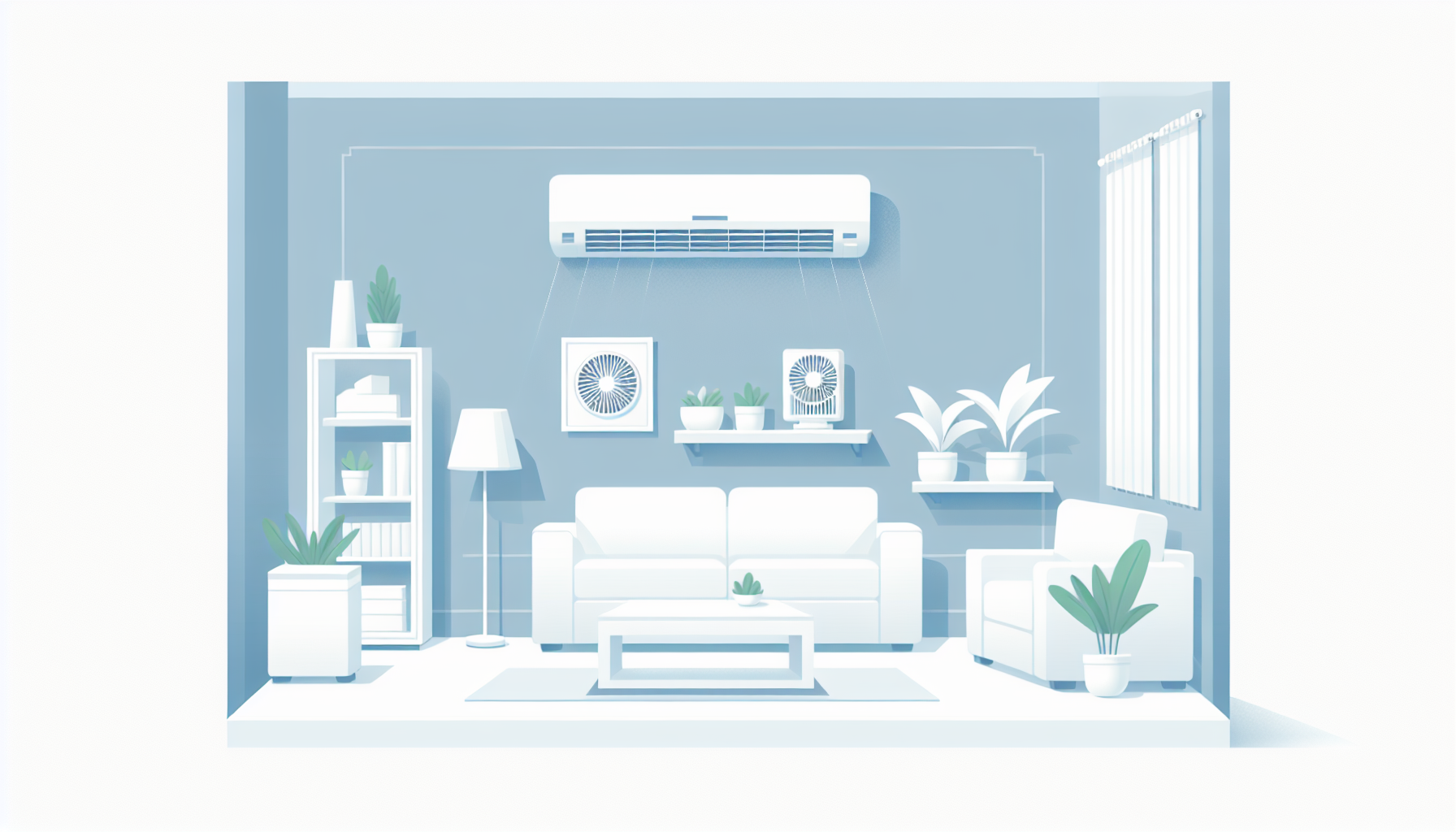AC Repair Common Issues
Overview of Common AC Problems
Owning a home means facing plenty of challenges, and your air conditioner acting up is sure to be one of them. Knowing the usual suspects when it comes to AC troubles can save you a whole lot of headache later. Here’s a rundown of what might bug your AC setup:
| Common AC Problems | What’s Going On? |
|---|---|
| AC Not Turning On | When you hit ‘cool,’ it gives you the silent treatment. |
| Insufficient Cooling | The air feels barely cool, not the arctic blast you crave. |
| Water Leakage | Puddles near the AC might mean your drain line’s seen better days. |
| Unusual Noises | Clanks or hisses might mean your AC’s got a ghost in the machine. |
| Frequent Cycling | Constant on-and-off is a sign your AC’s up to something weird. |
| Ice Build-Up | Ice on the coils could mean your AC’s having a chilly problem. |
Getting familiar with these gremlins means you can decide the right time to roll up your sleeves for a DIY fix or call in the cavalry.
Diagnosis of AC Issues
Figuring out what’s wrong with your air conditioner isn’t like solving a Rubik’s Cube – it can be pretty simple if you know where to start. Here’s a plan to tackle those pesky AC quirks:
-
Check the Thermostat: Make sure it’s in “cool” mode and set to the right temp. If it’s the programmable type, double-check it’s on the right schedule.
-
Inspect Power Supply: Check it’s plugged in and the circuit breaker hasn’t thrown a tantrum. Sometimes, an easy reset can bring it back to life.
-
Examine the Air Filter: A filter that’s all clogged up is like putting a sock in your AC’s mouth. Swap it out every couple of months to keep things breezy.
-
Check for Ice Formation: If there’s ice peeking out of the coils, something’s not flowing right, or you’ve got a refrigerant hiccup. Let it defrost before probing further.
-
Listen for Unusual Sounds: Notice when and what kind of racket it’s making. Is it a bang, clatter, or hiss? Log it for when you’re consulting the pros.
When in doubt, or if things get dicey, reach out to your local air conditioner company. Better safe than shelling out loads later, right? Spotting problems early could mean faster, cheaper solutions.
Troubleshooting Codes
When your air conditioner acts up, it can feel like deciphering hieroglyphs. Those cryptic codes that pop up are more than random letters and numbers; they’re like tiny messages from your system, pleading for help. Let’s crack the code, solve the mystery, and maybe save you a few bucks.
Understanding HVAC Error Codes
Your heating, ventilation, and air conditioning (HVAC) system is like a snazzy gadget that talks back when something isn’t right. Those error codes have probably left you staring at your thermostat before. Think of them as your AC’s way of sending out an SOS. Each code is a clue, a little hint toward what’s going wrong. Manufacturers might play it loose with the specifics, but the general code patterns usually stick around.
Here’s a breakdown of some frequent troublemakers:
| Code | What It Means |
|---|---|
| E1 | Sensor’s playing hooky |
| E2 | Refrigerant’s feeling low and lonely |
| E3 | Pressure’s rising – danger zone! |
| E4 | Indoor unit’s giving the cold shoulder |
| E5 | Outdoor unit’s sending static |
Interpreting Error Messages
When a code flashes up, it often comes with a message that’s trying like heck to speak your language. Your trusty (but sometimes forgettable) air conditioner manual might have some specific translation help for your model.
Let’s say your system throws out an “E2” – your refrigerant’s not up to scratch, which might mean there’s a sneaky leak somewhere. For this, you might have to dial up the cavalry, a.k.a., a pro from your go-to HVAC company, to check what’s leaking and why.
Here are some tips for tuning into what your AC is trying to tell you:
- Manual reading matters: Dust off that manual. It might seem tedious, but it’s your quickest guide to what that code means.
- Check for oddities: Weird noises? Smells that remind you of high school chemistry? Certain spots in the house feeling like a sauna while others are freezing? Take notes!
- Call in the troops: Sometimes, it’s best for the experts to step in, especially for big stuff like refrigerant woes or those pesky sensor errors. There’s a whole world of local HVAC heroes ready to save the day.
Figuring out these codes can be your first ace up the sleeve in tackling AC hiccups. If your sleuthing points to a bigger issue, consider letting the pros step in. And if you’re itching for more advice, our stash of articles on picking the best HVAC system or tried-and-true AC fixes, might just hit the spot.
Solutions and Fixes
When wrangling with AC issues, it’s handy to know your options for getting things back on track. Some hiccups are a breeze to fix solo, while others require a pro’s touch. Here’s your game plan for tackling both.
DIY Solutions for AC Problems
Sometimes, your AC just needs a little TLC from its loving owner. Here’s how you can tackle the usual suspects:
| AC Problem | Quick Fix Ideas |
|---|---|
| AC not blowing cold air | Swap out grubby air filters or double-check your thermostat settings. |
| AC is making strange noises | Peek inside for wobbly screws or debris getting all up in the fan’s business. |
| AC not turning on | See if the circuit breaker has done a surprise flip; give it a nudge if it has. |
| AC is freezing up | Make sure nothing’s blocking airflow and clean those coils (why is my ac freezing up). |
Before you dive in, gear up with the right safety gear. If these tweaks don’t cut it, it might be time to holler for an expert.
When to Call a Professional
While you can handle some stuff, there are times you gotta wave the white flag and bring in the big guns. Here’s when it’s best to seek out a pro:
| Situation | Why You Need a Pro |
|---|---|
| Frequent breakdowns or repairs | Repeated problems could hint at bigger trouble under the hood. |
| Refrigerant leaks | This isn’t a DIY affair; you need certification and the right tools. |
| Electrical issues | Leave fiddly wiring and circuit mysteries to the experts to stay safe. |
| Inability to diagnose the problem | If error codes flash and leave you scratching your head, a whiz can decipher them (HVAC Error Codes). |
Pinning down a trustworthy air conditioner company is a must for solid repairs and upkeep. Seek those who prioritize good customer vibes and bring plenty of know-how to the table. If you’re hunting for help, try searching for hvac near me to kick things off.
Innovations in HVAC
The HVAC game is spicing up! With nifty new developments, your home’s climate can feel just right while being easier on the wallet. Knowing what’s fresh out of the factory helps you pick the best air conditioner company for your pad.
Latest Innovations in Air Conditioning
Let’s talk gadgets and gizmos in air conditioning tech. They’re packing quite the punch for homeowners and tinkerers alike. Check out these cool upgrades:
| Innovation | What It Does |
|---|---|
| Smart Thermostats | These brainy gadgets remember how you like it, tweaking settings to keep things comfy and cut down on energy waste. |
| Variable Speed Compressors | Moves with the groove—adjusts its rhythm to meet the chill demand, making it a champ at energy savings. |
| Eco-Friendly Refrigerants | Keeps the planet happy with less nasty greenhouse gases floating around. Win-win! |
| Advanced Filtration Systems | Think of these as bouncers for your air, kicking out allergens and crud to keep your lungs happy. |
And, linking all these high-tech goodies to your smart home setup means you get to play weatherman from your phone, adjusting temps on the fly.
Benefits of Innovative HVAC Solutions
Jumping on the HVAC innovation bandwagon isn’t just about showing off to the neighbors. These snazzy setups bring juicy perks:
- Energy Efficiency: Slice through your electric bill like butter while doing Mother Earth a favor.
- Dough in Your Pocket: Sure, getting the latest gear ain’t cheap. But look at those dwindling monthly bills; you’re basically printing money.
- Ultimate Comfort: Chill vibes with your space feeling just right. Say goodbye to those stuffy noses and sneezes.
- Total Control: Skip to the beat of your own drum by tweaking temps from your couch, office, or that favorite beach spot.
Keeping your finger on the pulse of HVAC trends means smarter choices for cozy air at home. For more juicy details on picking out a primo setup, see our guide on best hvac system. Get savvy with this tech, and you’re all set to keep cool while saving green!
Marketing Strategies for HVAC Companies
Importance of Marketing for HVAC Businesses
Alright, let’s talk shop. If you’re in the HVAC game, your marketing must be kicking some serious butt to get you noticed. People hunting for HVAC services love to surf the net—65% of ’em hit up online searches before dialing a company’s number (LinkedIn). So, you gotta flash that online presence to reel in prospects.
Shaking up your marketing vibe helps too. Throwing in fresh ideas is key, even if your budget’s tighter than a new pair of shoes (Embraco). Crafting a solid marketing plan not only boosts your customer count, but also keeps the old ones sending you postcards.
Effective Marketing Channels
Now, let’s not make this harder than it is. Here’s where you should set up shop to shout about your HVAC services:
| Marketing Channel | Description |
|---|---|
| Search Engine Optimization (SEO) | Juice up your site so it shows up when folks hit search. Tons of service seekers are online, and this helps them spot you faster (LinkedIn). |
| Email Marketing | Fire off some smartly targeted emails. With every buck you toss into email marketing, you’re looking at a $40 return—that’s not couch change (ServiceTitan Blog). |
| Social Media Marketing | Hit up places like Facebook, Instagram, and the Tweet-space to chat with your crowd. It builds a loyal crew and lets you shout about deals and new tricks you’re pulling out of the hat. |
| Pay-Per-Click Advertising | Get those PPC ads going to spotlight your biz. This approach zeroes in on the folks you wanna talk to and throws them at your site pronto. |
| Content Marketing | Whip up content that answers HVAC head-scratchers. Blogs, vids, and infographics make you the go-to guru and lures folks to your webpage. |
Stick with these channels, mix ’em up a bit, and you’ll be chumming the waters for clients in no time. Whether you’re a tiny HVAC biz or a big player, these moves can light up your local presence and have customers knocking down your door.
Top Air Conditioner Brands
Hey there! Picking an air conditioner can be tricky, but knowing which brands stand out sure helps. Here’s the scoop on some top-notch AC companies and what they’re all about.
Overview of Leading AC Brands
| Brand | Life Expectancy | Parts Warranty | Compressor Warranty | Price Range |
|---|---|---|---|---|
| Carrier | 20 years | 10 years | 10 years | $5,700 – $16,500 |
| Trane | 20 years | 10 years | 12 years | $5,700 – $16,500 |
| Goodman | 18 years | 10 years | 10 years | $5,100 – $15,000 |
| Lennox | 15 years | 5 – 10 years | – | $6,100 – $24,500 |
| Rheem | 20 years | 10 years | 10 years | $5,600 – $16,100 |
(Info from Atlas AC Repair.)
Features and Pricing
Let’s break down what makes each brand tick and how they can hit your wallet:
-
Carrier: Known for its solid build and smart tech, Carrier air conditioners chug along for about 20 years. With a 10-year parts and compressor warranty, it sits between $5,700 and $16,500. Great option if you’re looking for durability with a side of snazzy features.
-
Trane: Nearly matching wits with Carrier, Trane units often stick around for two decades. They tout a 10-year parts warranty and a 12-year compressor warranty—giving a bit extra peace of mind. Price-wise, they’re shoulder to shoulder with Carrier—$5,700 to $16,500.
-
Goodman: If you’re eyeing your budget, Goodman’s your friend. Part of Daikin Industries, their units last about 18 years, and they also offer a 10-year warranty for parts and compressors. Goodman channels affordability, running from $5,100 to $15,000.
-
Lennox: Think high-end with Lennox. They’re all about those high SEER ratings (some electric bill relief!), but they have had hiccups with quality checks recently. Roughly 15 years is what you can expect it to last, with parts warranties from 5 to 10 years. The cost roller-coasters between $6,100 to $24,500.
-
Rheem: Rheem walks the tightrope between flashy and frugal. They dangle a 20-year lifespan carrot and an even 10-year warranty for both parts and the compressor. Prices hover around $5,600 to $16,100, appealing to folks who want a bit of both worlds.
Ultimately, finding the right air conditioner is crucial for keeping your home chill and your mind at ease. Each brand has its quirks, so knowledge is power in making the best choice. For deeper chats about models or help with hooking it all up, peek at HVAC near me.




